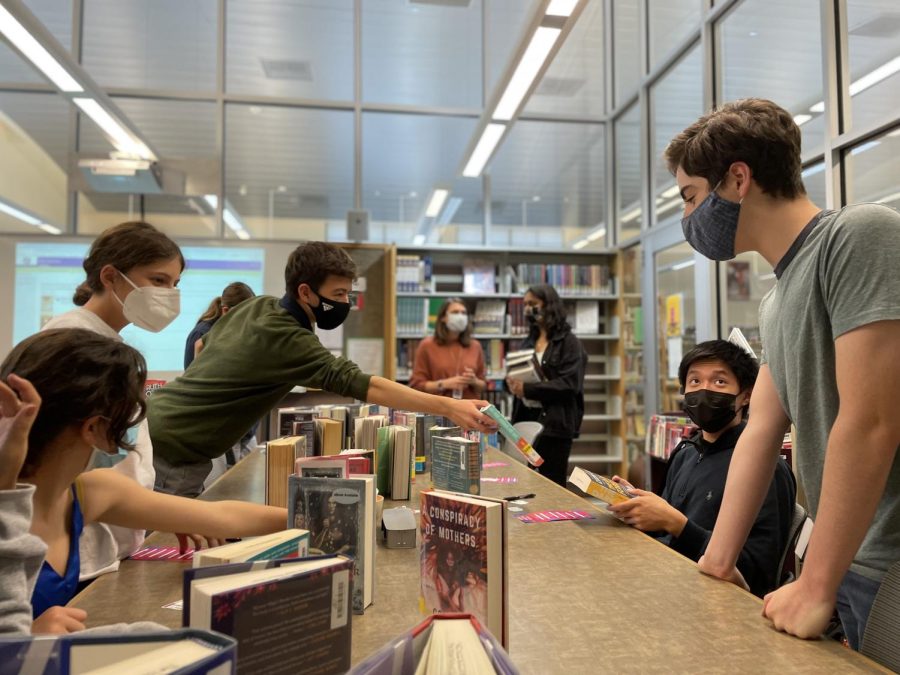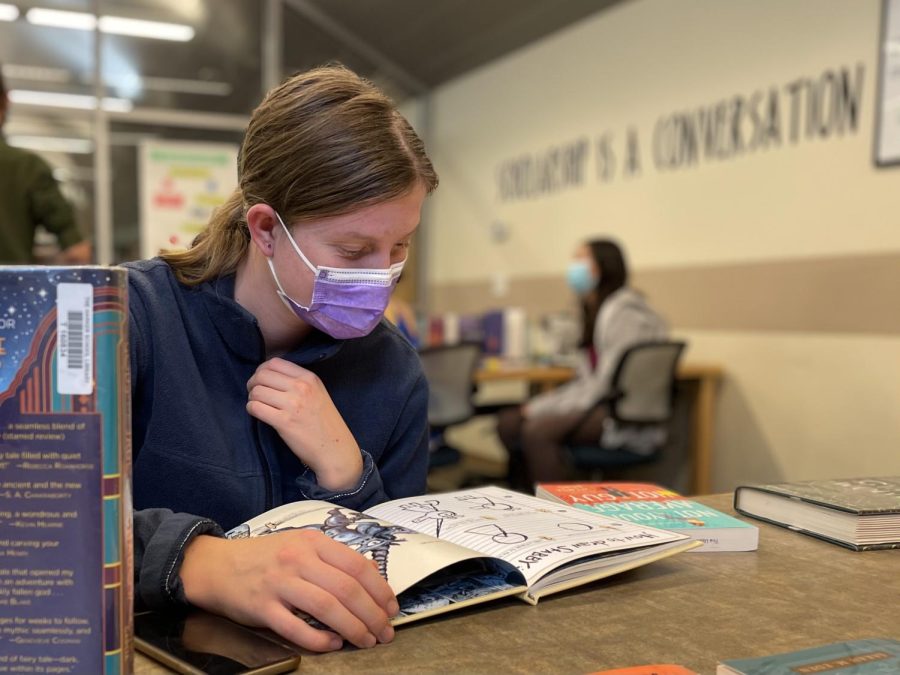Flipping and scrolling through the pages
Social media platforms and digital media make reading more popular and accessible
Rupert Chen (11) reaches to hand a book to Nicholas Wei (11) as their fellow Book Party attendees share their thoughts on the books featured at the gathering.
“We’re happy, free, confused and lonely in the best way…”
Taylor Swift’s “22 (Taylor’s Version)” plays in the background as students mill about in the library classroom, picking up books from artfully arranged lines of hardcovers that stand upright on the tables. The upper school library hosted a Book Party on Friday, Nov. 19, where students played Book Bingo, folded origami bookmarks and explored captivating reads before the start of Thanksgiving break.
When the pandemic started, the Harker librarians adapted the library to a COVID-safe environment. Through the promotion of Sora, an e-book library and reader, and curbside checkouts, they saw a rise in content circulation. Upper school librarian Amy Pelman attributed this trend to an increase in time that people had on their hands.
“With the pandemic [and remote learning], people actually had more time to read,” Pelman said. “When we were all stuck at home, more people turned to reading because it was comforting and a good escape during the uncertainty of Covid. It provided a nice outlet for people, so I do think that there was an uptick.”

After stepping into the position of Book Blog advisor last year, Pelman decided to create a leadership team to make the organization more student-focused. Now, the team has expanded beyond collecting book reviews to writing book recommendations and hosting various contests such as the fanfiction writing competition.
“Not only do we continue to have book reviews and other kinds of content, we’re expanding into other ways to engage the campus community to have fun and celebrate books and reading,” Pelman said.
Senior Ann Ryan, a member of the upper school Book Blog leadership team, will be starting her own column on the blog, Ann on Audio, to review audiobooks. Ann enjoys the convenience of audiobooks, which she says has allowed her to significantly increase her content intake.
“One of the biggest [ways to start reading more] is finding a book you like,” Ann said. “The other one is finding the right medium for you. If you can carry a book around with you, [read] anytime you get five minutes.”
As both the Publicity Committee Chair of the Book Blog and a BookTokker, or a TikTok creator who posts book-related content on “BookTok,” Alysa Suleiman (12), known as @the.rising.writer on the app, works to publicize reading and writing through her videos.
“I saw the same mission as the Book Blog [on BookTok]: promoting greater diversity and promoting a love for reading,” Alysa, who started her platform in March 2021 and now has over 130,000 followers, said. “Reaching hundreds of thousands of people who feel the same way as you do about reading, that was just so powerful to me.”
Driven by her ultimate goal of writing her own book, Alysa creates her most popular TikToks, ones that teach her audience new vocabulary or descriptive language (such as “how to describe drowning” or “how to describe a forest”), to help her followers and improve her own writing.
Sophomore James Blenko attributes the rapid popularity of BookTok to a resurgence of Gen Z’s interest in particularly dystopian and romance, due to a sense of loneliness that everyone felt during isolation. As a former BookToker, they experienced the full effect of social media’s impact on reading popularity, witnessing different genres rise and fall in accordance with trends on TikTok. James believes BookTok contributed significantly to the comeback of young adult novels.
At the same time, BookTok allows authors, especially newer ones, to connect with their fans and promote their work, bridging the gap between writer and reader. The link between artist and audience crafts a reliance on social media as a community, and an immersive environment between deepened interconnected relationships. According to Pelman, this connection can even be seen on a small-scale level through Book Blog’s Instagram where she thinks, “people do turn to social media for reading recommendations.”
“BookTok has had an immeasurable effect on sales,” Pelman said. “BookTokkers have driven books onto the bestseller list that have been out for years and years and years. That has been a really interesting phenomenon.”
Booksellers and publishing companies have capitalized on the trends, with Barnes and Nobles dedicating a website section to BookTok bestsellers, and Penguin Teen collaborating with BookTok influencers by sending advanced reader copies (ARCs), according to James.
Anika Fuloria (‘21), an avid reader who made reading-related videos on “BookTube” the second semester of her senior year, started her channel to obtain ARCs herself, which are copies of unreleased upcoming stories sent to content creators for marketing and publicity purposes. As a member of the Book Blog and the founder of the Diversity, Equity and Inclusion Book Club in high school, Anika began producing video book reviews and soon found value in both reading advanced copies and practicing speaking skills, though she has since removed her videos.
“You’re the one coming up with the questions, and you’re the one coming up with the answers when you’re creating a review, which I thought was really interesting,” Anika, who is also interning at the social reading startup Fable, said. “Even today, when I’m recommending books casually to friends, I try to do the same approach of, here are the things I like, and here’s some critical commentary.”
While videos on TikTok, which are now a maximum of three minutes in length, limit the amount of content viable and result in quick reviews and recommendations, YouTube videos can often go into depth about multiple books, discussing them all together and how they intersect. Anika finds that both provide a space for those passionate about reading, despite their differences.
“A lot of people think reading is a solitary activity, but there’s so much community to be found by watching people’s content or creating content of your own,” Anika said. “The lasting power of reading really came from something like TikTok, and what I’ve seen is that it’s a lot of the same books recommended like “The Song of Achilles,” so you get books that are already pre-vetted.”
Online book communities underscore an underlying desire for connection in an isolated period. The rise of subculture aesthetics, like cottagecore, but especially dark academia, highlights a desire to escape from the chaos of society. Dark academia, filled with ivy-covered Gothic buildings, ink-stained journals, and flickering candlelight, draws from an idealized aesthetic of higher education. The arts-and-academia-centered social media subculture permeates BookTok trends, from Donna Tartt’s 1992 psychological mystery “The Secret History” to Oscar Wilde’s classic “The Picture of Dorian Gray.”
For one, James hopes this appreciation of academia will spark more intellectualism and a Golden Age of literature, fueled by the vast opportunities for connecting with fellow reading and writing enthusiasts through the Internet.
“The concept of being an intellectual, reading poetry, has come back into popularity for some people,” James said. “A lot of classical books you read are from at least a hundred years ago, so I’m hoping that we’ll have a generation of writing and poetry that really rises above.”
The seeming contradiction between dark academia’s social media presence and its romantic essence is a paradox that James characterizes as “reading being an escape from life, and also the grounding of intellectualism and the dark academia culture that’s very pure and human.”
But even if dark academia isn’t your jam, you can still be a reader and explore other genres like fantasy, nonfiction and more.
“You have to just find your own niche,” Alysa said. “The pandemic reminded me that I can always go back to books when I want to, and it’s become a great way to explore other worlds. If you’re ever getting tired of this one, open a book and hop into another.”
As we continue to return to a new normal, despite leaving our little Zoom boxes, we still remain enraptured by our glowing screens and digital numbers. We seek to connect through social media, crafting romanticized worlds of daydreams, romance and fantasy. As we head into a new year, when you’re sitting in the cozy confines of a coffee shop or your bedroom on a cold day, consider exiting out of TikTok, Instagram, and turning to the tangible pages of a physical book or the soothing sounds of an audiobook. We can then fully be immersed in fictional worlds, yet still, have our feet grounded into a rooted sense of reality.

Sydney Ling (10) is a reporter for Harker Aquila, and this is her second year on staff. This year, she hopes to write about the intersection between culture...

Emily Tan (12) is the co-editor-in-chief of The Winged Post. This is her fourth year on staff, previously serving as the Winged Post features editor, and...


















![“[Building nerf blasters] became this outlet of creativity for me that hasn't been matched by anything else. The process [of] making a build complete to your desire is such a painstakingly difficult process, but I've had to learn from [the skills needed from] soldering to proper painting. There's so many different options for everything, if you think about it, it exists. The best part is [that] if it doesn't exist, you can build it yourself," Ishaan Parate said.](https://harkeraquila.com/wp-content/uploads/2022/08/DSC_8149-900x604.jpg)




![“When I came into high school, I was ready to be a follower. But DECA was a game changer for me. It helped me overcome my fear of public speaking, and it's played such a major role in who I've become today. To be able to successfully lead a chapter of 150 students, an officer team and be one of the upperclassmen I once really admired is something I'm [really] proud of,” Anvitha Tummala ('21) said.](https://harkeraquila.com/wp-content/uploads/2021/07/Screen-Shot-2021-07-25-at-9.50.05-AM-900x594.png)







![“I think getting up in the morning and having a sense of purpose [is exciting]. I think without a certain amount of drive, life is kind of obsolete and mundane, and I think having that every single day is what makes each day unique and kind of makes life exciting,” Neymika Jain (12) said.](https://harkeraquila.com/wp-content/uploads/2017/06/Screen-Shot-2017-06-03-at-4.54.16-PM.png)








![“My slogan is ‘slow feet, don’t eat, and I’m hungry.’ You need to run fast to get where you are–you aren't going to get those championships if you aren't fast,” Angel Cervantes (12) said. “I want to do well in school on my tests and in track and win championships for my team. I live by that, [and] I can do that anywhere: in the classroom or on the field.”](https://harkeraquila.com/wp-content/uploads/2018/06/DSC5146-900x601.jpg)
![“[Volleyball has] taught me how to fall correctly, and another thing it taught is that you don’t have to be the best at something to be good at it. If you just hit the ball in a smart way, then it still scores points and you’re good at it. You could be a background player and still make a much bigger impact on the team than you would think,” Anya Gert (’20) said.](https://harkeraquila.com/wp-content/uploads/2020/06/AnnaGert_JinTuan_HoHPhotoEdited-600x900.jpeg)

![“I'm not nearly there yet, but [my confidence has] definitely been getting better since I was pretty shy and timid coming into Harker my freshman year. I know that there's a lot of people that are really confident in what they do, and I really admire them. Everyone's so driven and that has really pushed me to kind of try to find my own place in high school and be more confident,” Alyssa Huang (’20) said.](https://harkeraquila.com/wp-content/uploads/2020/06/AlyssaHuang_EmilyChen_HoHPhoto-900x749.jpeg)




